PHOENIX – Maya Dailey plants zinnias along a small portion of her nearly 3½-acre organic farm just north of South Mountain Park. It’s on 32nd Street between Southern Avenue and Baseline Road – an unexpected spot for horses, chickens, goats and lush crops.
When the land she rents went on the market three years ago, Dailey faced losing the plot she had spent seven years cultivating.
“What that does immediately for me as a farmer is it takes my wind out of my sails,” she said.
Dailey isn’t the only urban farmer being squeezed. Phoenix lost nearly 200 acres of farmland to urban sprawl and development in 2020 alone, according to city officials. Dailey said the losses are spurred by a lack of appreciation for local food systems.
“I think Arizona has made a big mistake and has not really thought about the value that (the urban farming) industry brought to our country, the world and to our local community, and we didn’t protect it,” Dailey said. “We saw dollar signs, and food doesn’t matter.”
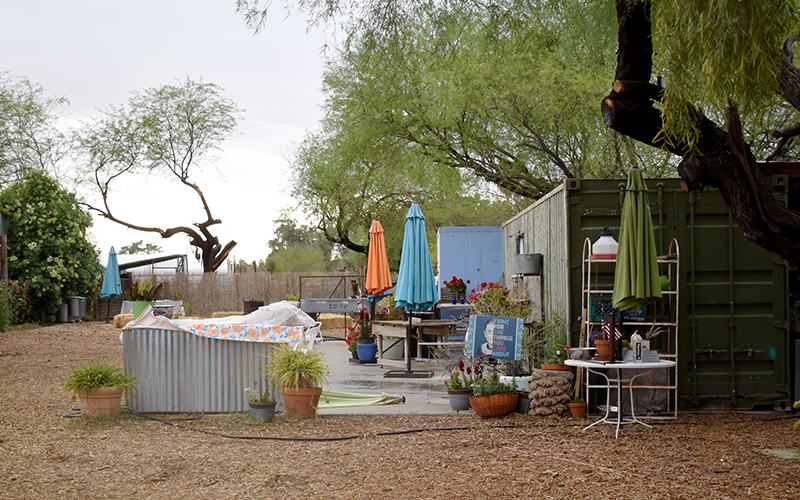
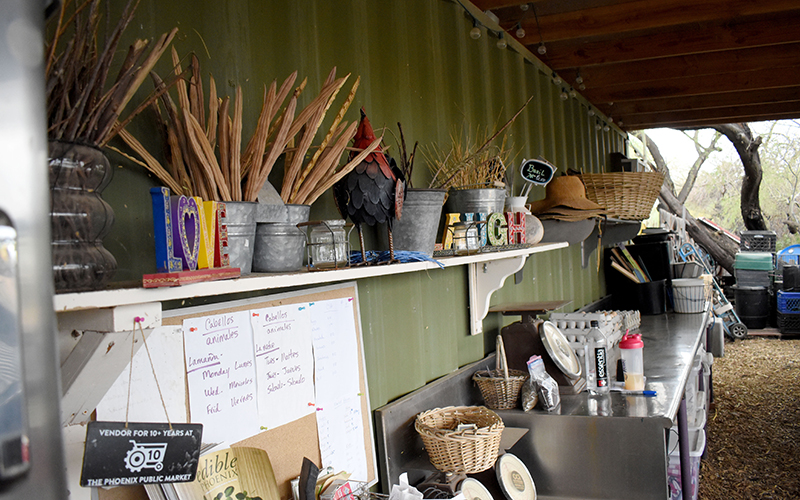
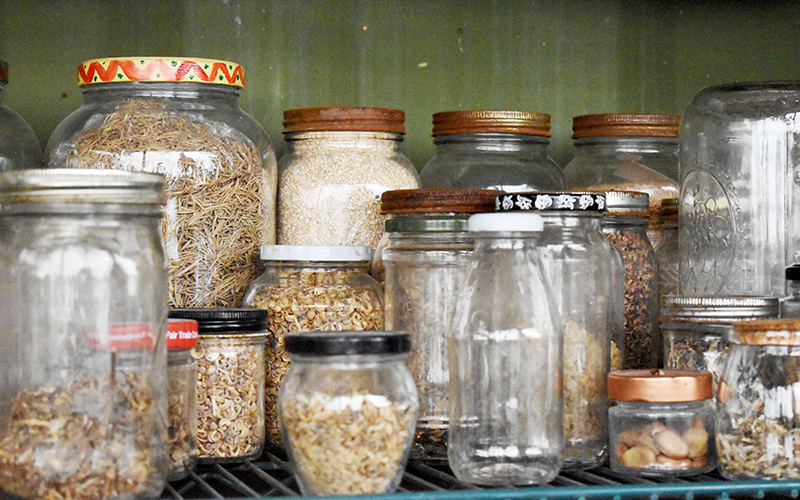
Left: “I’m small, I’m local, I’m organic,” Maya Dailey says of her urban farm in south Phoenix. “We grow a variety of different herbs and veggies and flowers.” Center: Maya’s Farm in south Phoenix has a prep station to ready produce and eggs for sale. “We need to save farmland, and we don’t need to just save small-scale farmland,” Maya Dailey says on March 28, 2022. Right: Jars of seeds sit at Maya’s Farm in south Phoenix on March 28, 2022. “I’m definitely a voice for seed saving because I believe it’s really important,” Maya Dailey says. (Photos by Hope O’Brien/Cronkite News)
Unlike those 200 acres of farmland paved over by urban expansion, Maya’s Farm was saved through a new city-led effort, the Farmland Preservation Program.
The program, managed by the nonprofit Central Arizona Land Trust, aims to place conservation easements on urban farmland at risk of being sold. The trust, which is known as CALT, said Phoenix funneled $1 million from COVID-19 relief funds into the program.
A conservation easement is a “restriction that limits the future use of a property to preservation, conservation, or wildlife habitat,” according to the Arizona Department of Revenue. The easements are a contract or agreement between landowner and a land trust – for the Farmland Preservation Program, that’s CALT – where the landowner sells or donates development rights, according to the trust’s conservation specialist, Sharma Torrens.
Torrens said CALT, which has been around since 1989, conserves working land, including farms, ranches and wildlife habitats. The trust negotiates the terms of the conservation easement for the preservation program, she said.
“You have to do a phase one environmental site assessment, a survey, a mineral assessment, an appraisal,” Torrens said. “We negotiate it from beginning to end, work with the landowner, get all the due diligence done, get all the contracts in place and then we take it through with the title company to closing and so on.”
Maya’s Farm was the first to be saved by a conservation easement funded through the Farmland Preservation Program. Phoenix funded more than three-quarters the developmental-rights cost for the land, Torrens said, while CALT and partners fundraised to cover the rest.
The easement, once finalized, is binding in perpetuity and decreases the land’s value, she said, making it more affordable for the farmers to purchase the land they cultivate.
“It significantly reduces the property values,” Torrens said, “so now the lessee, Maya, can go in and buy the property for significantly cheaper.”
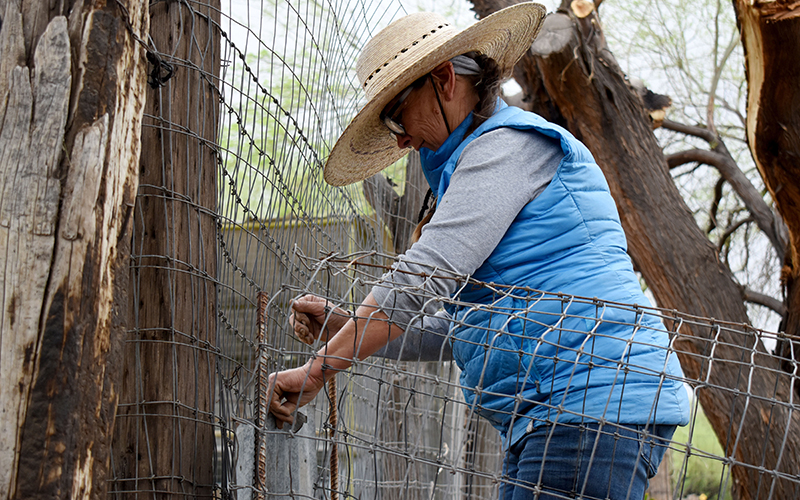
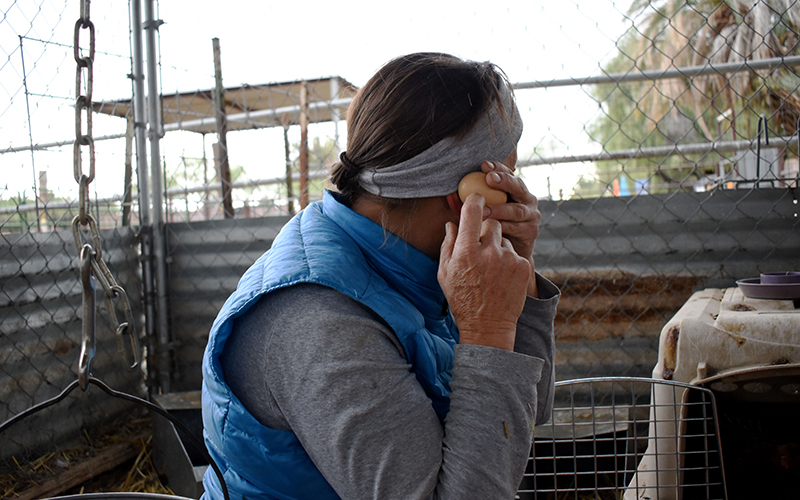
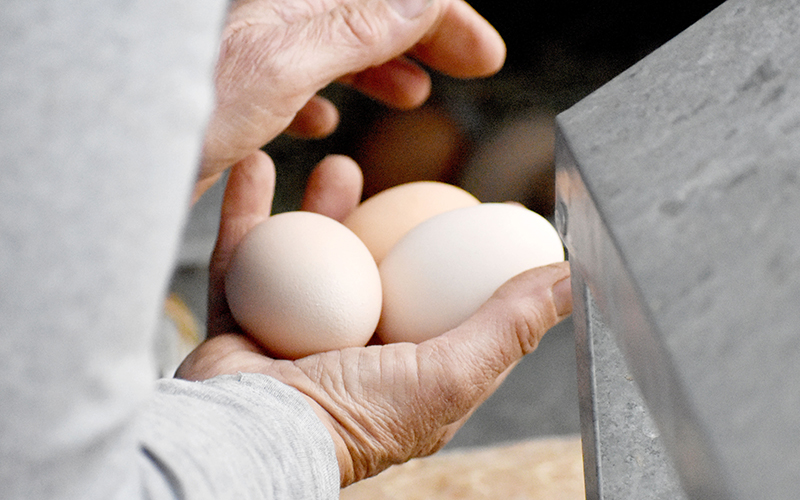
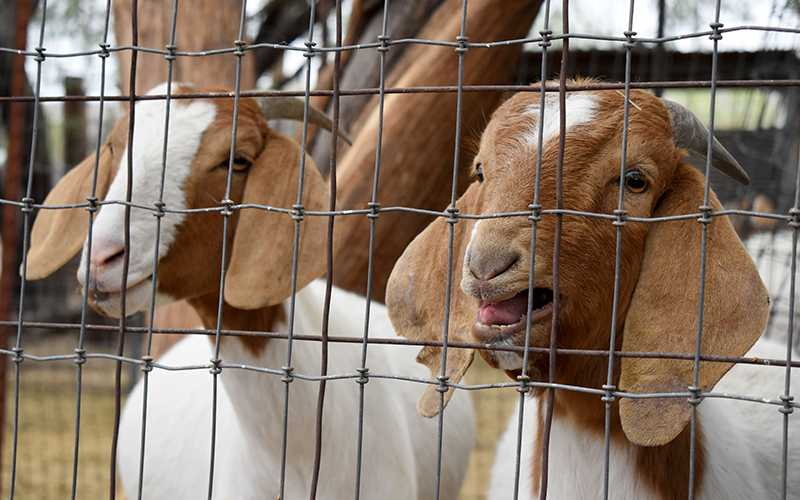
From left: Maya Dailey closes her chicken pen as rain and wind pick up at Maya’s Farm in sough Phoenix on March 28, 2022. According to Dailey, she built a “chicken tunnel” to allow her chickens to come and go from the pen and graze in the fields. Maya Dailey listens for sounds of a chick in a fertilized egg at Maya’s Farm in south Phoenix on March 28, 2022. Maya Dailey collects eggs from her chicken coop at Maya’s Farm in south Phoenix on March 28, 2022. Goats greet visitors at the front of Maya’s Farm in Phoenix on March 28, 2022. “I always wanted chickens and goats,” Maya Dailey says. “And here we are. We’re doing it now.” (Photos by Hope O’Brien/Cronkite News)
Torrens hopes more urban farmers learn about the program and what it can do for land that teeters on the edge of development.
“I don’t think a lot of folks understand the benefits of (conservation easements),” she said. “If they want to conserve their legacy and see it stay as a working farm, which we all do, then this is really a great option for them.”
Torrens said CALT has enough funds to protect another 3- to 4-acre farm. The program is still open for applications for the 2022 fiscal year, but it’s unclear whether it will have future funding.
With her land off the market, Dailey is able to plant her zinnias with less worry over the chance of losing everything she has grown. In addition to flowers, Dailey sells produce and eggs at farmers markets and directly to consumers.
“Right now, because the conservation easement has gone through, I’m back to OK, the land’s here,” Dailey said. “It can be mine. Someday we can plant fruit trees, we can grow grapes, we can start really investing in the land to create a more productive food system here at this little farm.”
Farming is something that has been a constant in Dailey’s life. When she was young, she spent summers at her uncle’s dairy farm in Gilbert.
She spent time on the East Coast and then moved with her kids to the family farm before it relocated to Eloy. She then put down roots in south Phoenix and spent 14 years renting land at The Farm at South Mountain to start her own business, Maya’s Farm.
After those 14 years, she moved the farm to its current plot, which was saved by the conservation easement.
Although the easement on that land leaves Dailey bound by a document listing what she can and can’t do on the land, she’s optimistic the program can save farms for generations to come.
“I’m fine with it because I figure we set it up for the next generation,” Dailey said. “We’re going to set it up so that it goes to the next generation and it will always be a farm.”
Dailey said she hopes to purchase the land within a year, and she’s confident Maya’s Farm can become a starting point for more urban farmland to be conserved.
“We probably figured out a lot of the kinks and hurdles when it comes to the next project that gets funded, which we want to have happen,” Dailey said. “We want other landowners to say, ‘Oh, this is valuable, we want to see farms stay in existence.’”
Cronkite News reporter Emma VandenEinde contributed to this story.